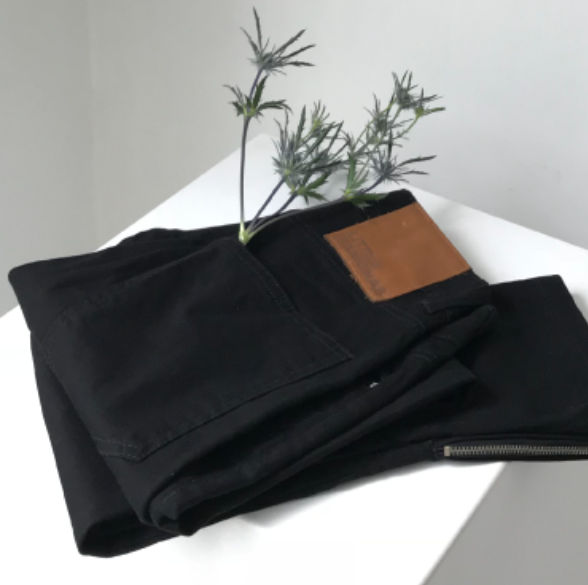




Keep this story going! Share below!
Little Ramonas by implementing its eco-conscious system has managed to bring out different collections and clothing lines. They are mainly focused on helping against the impact of the environment, from the production of these garments, to the reuse of these same.
In 2009 Paula Beltran, Camila Saldarriaga and Marina Puerta, founders of Little Ramonas, had the idea of starting their own company, breaking the stereotype of common fashion companies, collecting unique, and special pieces, reinventing them with second-hand garments, and also having a positive ecological impact.
First, their leather products are chrome-free, use fewer salts, the organic dyes are soluble and the waste from their production serves as fertilizer in local agriculture. Secondly, its denim line uses blends of cotton and PET polyester recycled from plastic bottles, achieving a good level of quality, allowing its garments to be durable, thanks to the fabrics implemented in them, while promoting plastic recycling. In addition, in the manufacture of jeans they use 50% less water than the average of what the vast majority of clothing brands use, due to their highly adsorbent twill fabrics, the number of times these garments are washed is minimal.

The name of this venture came from a song entitled, "Little Ramona", where the protagonist of the video identified them since she was an adventurous, carefree and fresh girl, who liked vintage pieces, which was the first thing the founders did in the first line of the company and that summarizes the attitude of the brand.
Before creating the company, the founders collected pieces of second-hand clothing, innovated them and sold them as pieces on a limited basis. Their goal was to produce garments that could be worn at any time, in order to inherit them from generation to generation, because trends always go and come with the passage of time and their motivation was the taste for creating unique timeless pieces and special, where they reinvent classic basic pieces with old garments.
The company has a positive impact in the economic sphere, marketing its products both domestically and abroad, generating profits for the company; in the social sphere, generating quality garments and reusing these garments, and finally in the environmental sphere, reducing up to 50% in the washing of garments, in waste and chemicals that directly impact ecosystems and thus avoiding global warming.
Thus meeting 5 of the SDGs: Goal 6 (Clean Water and Sanitation), Goal 8 (Decent Work and Economic Growth), Goal 13 (Climate Action), Goal 14 (Underwater Life) and Goal 15 (Life of Ecosystems).
Little Ramonas complies with Goal 6, which seeks to ensure access to safe drinking water globally by 2030. The founders of this company in its jeans manufacturing reduce water consumption by 50% less than the average of other clothing manufacturing companies and. In addition to this, they encourage their customers to be part of the change through the reduction in the washing of the garments because, due to the manufacturing materials, they do not have to be washed as often compared to other garments.
Goal 8, which promotes sustainable economic growth and decent employment for all. It is evident that the company carries out various measures, promoting women, being the main creators of this project; it boosts the economy, marketing its products with different suppliers, creating innovation and entrepreneurship, which they share through various online platforms, and carry out the use of different materials and processes that help mitigate climate change and waste that affect the environment.
These last three objectives (13, 14, and 15) are mainly focused on caring for the environment, and are reflected in the way the company uses materials and gives purpose to the waste of its products, such as the reuse of different elements (plastic bottles, among others). With these actions, the environmental impact is not so negative and waste is prevented from reaching marine and land surfaces, thus prolonging the life of ecosystems.
Thanks to its reputation and customer comments on the quality of its garments and their durability, the company has gained recognition and allies in the Latin American and North American markets.
The success of this company has been the quality and durability of its products; Mariana Puerta, co-founder, told us testimonials from customers who were very satisfied with their garments, since, despite the passage of time, they remain intact and in good condition; With this you can perceive the positive environmental impact they have, since, being so resistant, it is not necessary to continuously buy clothes and not so much waste is generated by having to discard the clothes that have little durability, since the waste of the latter is not positive for the environment.
All the production of this brand is made in Colombia. This has a positive social impact since it is taking advantage of the national market as well as breaking with the established parameters of fashion trends, they decide to choose a timeless style proposing a different paradigm of fashion by implementing garments based on recycled materials.
Get stories of positive business innovations from around the world delivered right to your inbox.
Mariana Puerta, Cofounder

It is a fashion company, which has its own line of women's garments and has been in the industry for 12 years, making them with already used garments.